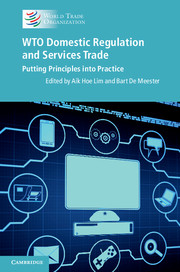Book contents
- Frontmatter
- Contents
- List of contributors
- Foreword
- Disclaimer
- Acknowledgements
- List of abbreviations
- 1 An introduction to domestic regulation and GATS
- Part I Impediments to services trade, regulatory theory and principles
- Part II Legal perspectives on WTO principles and domestic regulations
- Part III Case studies
- 8 Legal services in the United States
- 9 Telecommunications reform in China: fostering competition through state intervention
- 10 Information communications technology: the Mauritian experience of regulation and reform
- 11 Regulation of postal services in a changing market environment: lessons from Australia and elsewhere
- 12 Mobile money services provision in East Africa: the Ugandan experience
- 13 Financial services liberalization and regulation in Japan: implications for future negotiation on market access and domestic regulations
- 14 Domestic regulations in Malaysia’s higher education sector
- 15 Domestic regulations and India’s trade in health services: a study of hospital and telemedicine services
- 16 Operating integrated logistics services in a fragmented regulatory environment: what is the cost?
- 17 Domestic regulation of retail food distribution services in Israel: the missing link between food prices and social protest
- 18 Regulatory impact analysis: addressing the trade and regulatory nexus
- Part IV Concluding remarks
- Index
- References
13 - Financial services liberalization and regulation in Japan: implications for future negotiation on market access and domestic regulations
Published online by Cambridge University Press: 05 April 2014
- Frontmatter
- Contents
- List of contributors
- Foreword
- Disclaimer
- Acknowledgements
- List of abbreviations
- 1 An introduction to domestic regulation and GATS
- Part I Impediments to services trade, regulatory theory and principles
- Part II Legal perspectives on WTO principles and domestic regulations
- Part III Case studies
- 8 Legal services in the United States
- 9 Telecommunications reform in China: fostering competition through state intervention
- 10 Information communications technology: the Mauritian experience of regulation and reform
- 11 Regulation of postal services in a changing market environment: lessons from Australia and elsewhere
- 12 Mobile money services provision in East Africa: the Ugandan experience
- 13 Financial services liberalization and regulation in Japan: implications for future negotiation on market access and domestic regulations
- 14 Domestic regulations in Malaysia’s higher education sector
- 15 Domestic regulations and India’s trade in health services: a study of hospital and telemedicine services
- 16 Operating integrated logistics services in a fragmented regulatory environment: what is the cost?
- 17 Domestic regulation of retail food distribution services in Israel: the missing link between food prices and social protest
- 18 Regulatory impact analysis: addressing the trade and regulatory nexus
- Part IV Concluding remarks
- Index
- References
Summary
Introduction
It appears that negotiations under the General Agreement on Trade in Services (GATS) to liberalize financial services trade are not proceeding smoothly. No major progress has been recorded since the Fifth Protocol to GATS came into effect in 1999. Under such circumstances, in order to promote a progressive liberalization of financial services, some insist that rationality, objectivity and transparency in domestic regulation should be achieved according to the principles of GATS Article VI. However, it is extremely difficult to form a consensus on domestic regulation under Article VI between developed and developing countries. To complicate the issue even further, there appears to be no consensus or agreed definitions among World Trade Organization (WTO) members about the scope of application or the content of regulations subject to Article VI.
This chapter discusses various aspects of domestic regulation in light of Japanese experiences, examines the experience of financial system reform in Japan and draws lessons for advancing the GATS negotiations on financial services liberalization in the future. In order to maximize the benefits from liberalizing financial services, we argue that institutional frameworks to enhance the objectivity and transparency of investor protection laws and other domestic regulations should be put in place and enforced effectively, in addition to promoting the opening of markets to foreign services providers. In our opinion, the recent global financial crisis strengthened the validity of such a view.
- Type
- Chapter
- Information
- WTO Domestic Regulation and Services TradePutting Principles into Practice, pp. 221 - 238Publisher: Cambridge University PressPrint publication year: 2014



